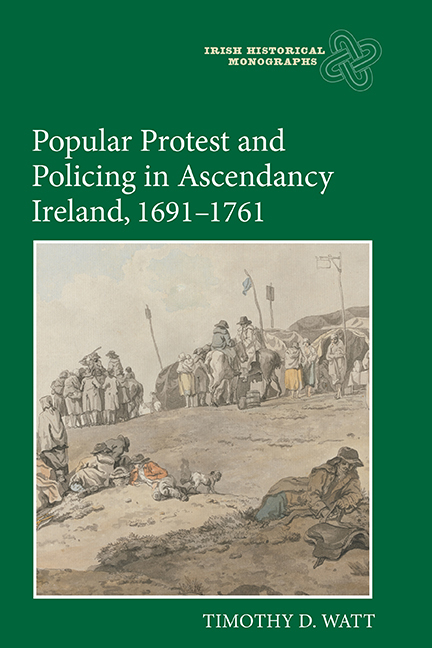Book contents
- Frontmatter
- Dedication
- Contents
- List of illustrations
- Acknowledgements
- Principal abbreviations
- Notes on conventions
- Glossary
- Introduction
- Part One Policing and large-scale disorder
- Part Two Popular Protest and Collective Action
- 4 ‘Mobs’, Authorities and Popular Politics
- 5 A ‘Rebellious Traditional Culture’ in Ireland
- 6 ‘Riot and Rescue’ and Anti-Taxation Protest
- 7 Journeymen, Masters and ‘Collective Bargaining by Riot’ in Dublin
- 8 Factional Gangs, Authorities and Corruption of the Law in Dublin
- 9 Conclusion
- Appendix: Irish Combination Acts, 1705–80
- Bibliography
- Index
- Irish Historical Monographs previous volumes
8 - Factional Gangs, Authorities and Corruption of the Law in Dublin
from Part Two - Popular Protest and Collective Action
Published online by Cambridge University Press: 12 October 2019
- Frontmatter
- Dedication
- Contents
- List of illustrations
- Acknowledgements
- Principal abbreviations
- Notes on conventions
- Glossary
- Introduction
- Part One Policing and large-scale disorder
- Part Two Popular Protest and Collective Action
- 4 ‘Mobs’, Authorities and Popular Politics
- 5 A ‘Rebellious Traditional Culture’ in Ireland
- 6 ‘Riot and Rescue’ and Anti-Taxation Protest
- 7 Journeymen, Masters and ‘Collective Bargaining by Riot’ in Dublin
- 8 Factional Gangs, Authorities and Corruption of the Law in Dublin
- 9 Conclusion
- Appendix: Irish Combination Acts, 1705–80
- Bibliography
- Index
- Irish Historical Monographs previous volumes
Summary
Corruption pervaded all areas of law enforcement in early eighteenth-century Dublin. Peace officers (constables and watchmen), gaolers, revenue officers and justices of the peace were accused variously of robbery, kidnapping, assault, running brothels, extortion, smuggling, murder, ‘thief-making’, rioting and even devil worship. Dublin Corporation, which had primary responsibility for the maintenance of law and order in the city, was implicated in these scandals: aldermen were accused of taking bribes, and the corporation as a whole was condemned for its failure to regulate the many hundreds of abusive constables. Pressurised into taking action, the Irish parliament undertook investigations in 1729, 1736 and 1738, and introduced reforms to make civil law enforcement more efficient and officers more law-abiding. The 1729 measures, dubbed as the ‘general reformation of abuses’ by the Dublin Intelligence, were particularly important. They resulted in the dismissal of the vast majority of Dublin's constables, dozens of revenue officers and two justices of the peace, and caused the downfall of Dublin's best-known and most controversial law enforcer, the Newgate gaoler John Hawkins. In 1736 the lords justices made another attempt to regulate the behaviour of law officers by reducing the number of constables, and two years later sixteen constables accused by the lord mayor of committing ‘mal practices’ were suspended from duty.
This chapter examines the part played by factional gangs in challenging corruption of the law in Dublin and pressurising parliament to undertake investigations and introduce reforms of law enforcement. A study of these investigations casts light on the modus operandi of law officers, in particular the unrestrained use of violence, extortion and bribery practised by unscrupulous public figures such as Hawkins, and ethical concerns regarding the treatment of prisoners. The flagrant abuses of power, to which Dublin Corporation often turned a blind eye, and the desire to protect their own communities, provoked a violent response from factional gangs, who attacked the forces of order and the symbols of authority. In turn, these popular violent protests put pressure on the parliament to take action against institutionalised corruption, and reforms were eventually made despite the opposition from Dublin Corporation. The chapter concludes with an assessment of the impact of these measures on the behaviour of officers in subsequent years and on changes, if any, in popular attitudes towards law enforcement.
- Type
- Chapter
- Information
- Popular Protest and Policing in Ascendancy Ireland, 1691-1761 , pp. 180 - 203Publisher: Boydell & BrewerPrint publication year: 2018



